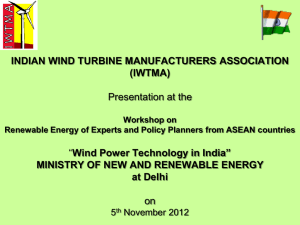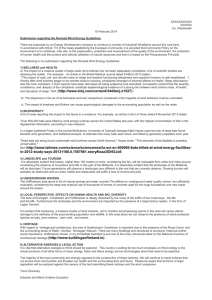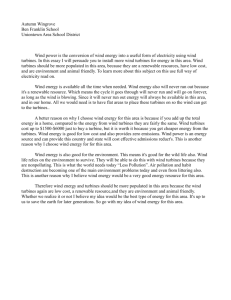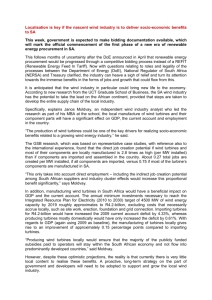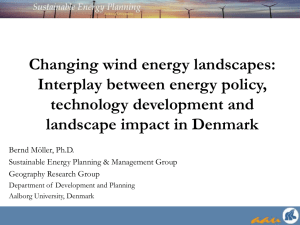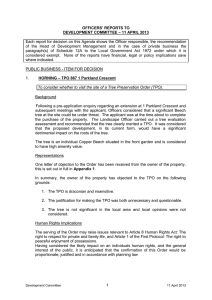The Bristol Port Company Wind Turbines
advertisement
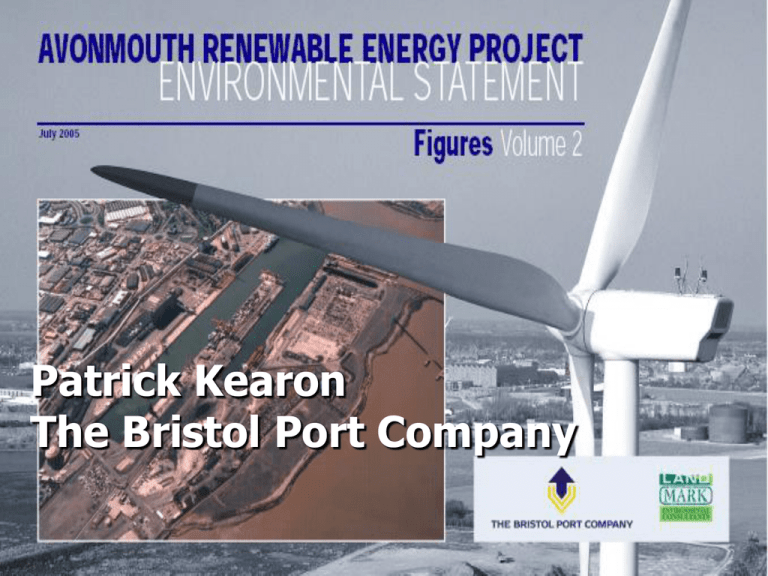
Patrick Kearon The Bristol Port Company Background • Global warming – we all need to reduce CO2 output from our activities • UK Target = 20% reduction in 1990 CO2 levels by 2010 • South West Target = 11-15% of electricity from renewable sources • Dependence on finite fossil fuels & increasing energy costs • UK is Europe’s windiest country - average mean wind speeds >7m/s (18mph) The Answer Imperative for The Bristol Port Company to develop a local renewable energy source to supply port demand Outline of Proposals • Erect 3 wind turbines (up to 3 MW), including associated bases and cables • Construct control building & access ways • Combined 9 MW = up to 75% of port’s electricity demand • Development site is 8.5 hectares of reclaimed land in Avonmouth Dock • Adjacent to Severn Estuary Site Location Site Selection - Alternatives • 9 potential locations short-listed and tested against 3 key factors: – Wind generating potential – Aviation safety (Filton Airfeld) – Possible impacts on birds using the estuary • This location in Avonmouth Docks was identified as optimum site • Turbine location finely adjusted to not interfere with air safety & bird migration routes The Preferred Site Typical Wind Turbine Dimensions Rotor diameter 70 metres (35m radius) 120m 393 ft Hub height 85 metres 279 feet Environmental Issues • • • • • • • • • • Geology/Ground Conditions Hydrology/Hydrogeology Ecology Landscape and visual impacts Archaeology Traffic and transport Noise and vibration Telecommunications Air traffic Marine navigation Landscape and Visual Impacts • Evaluate effect on local landscape • Turbines located in low-lying, heavily industrialised landscape, with many tall structures & buildings • Landform, structures & woodlands restrict visibility • Turbines will be visible from: – Avonmouth Village (partial, restricted views, change inevitable in places) – Pill (noticeable, but not intrusive) – Higher elevations e.g. Lawrence Weston & Shirehampton (more visible, but distant & panoramic, not intrusive) Photomontage of Landscape Ecology and Birds • No valuable habitats on site, but next to Severn Estuary SPA, SSSI and Ramsar site • Ecological surveys to inform assessment of impacts on wildlife, including – Extended Phase 1 habitat survey – Bird surveys (e.g. High tide/low tide counts, night time, migration and breeding surveys) • Key potential impacts on birds are Disturbance & Collisions • With mitigation no adverse impact during construction • 5 years monitoring (review in 2 years) Bird Movements Archaeology • Assessment of archaeological remains in the vicinity of the development site: – Terrestrial archaeology – Maritime archaeology and historic activity • Borehole assessment • No known sites or monuments affected by the development • Construction of turbines includes 30 metre piles into made ground • Mitigation/Monitoring – archaeological recording Historic Mapping Balance of Effects • No major adverse environmental impacts • Potential disturbance of SPA birds and changed views from areas of Avonmouth Village • All other negative impacts avoided or reduced by mitigation and design measures • 17-26% of south west’s renewable energy target • Provision of up to 75% of Port’s electricity • Significant reduction in green house gasses (18,319 tonnes CO2 /plus SO2 & NOx) Construction & Operation • Construction end 2006 • Construction programme about 36 weeks • In operation this time in 2007 • Operational life of 25 years • Turbines then either replaced, refurbished or removed & site reinstated The Way Forward • BPC agreement with Ecotricity who will construct, own and operate the turbines • BPC provided with energy for life of turbines • “Overspill” electricity is publicly available - see (http://www.ecotricity.co.uk) • We all need to do more to tackle global warming problem • Wind turbines can contribute to the renewable energy solution
